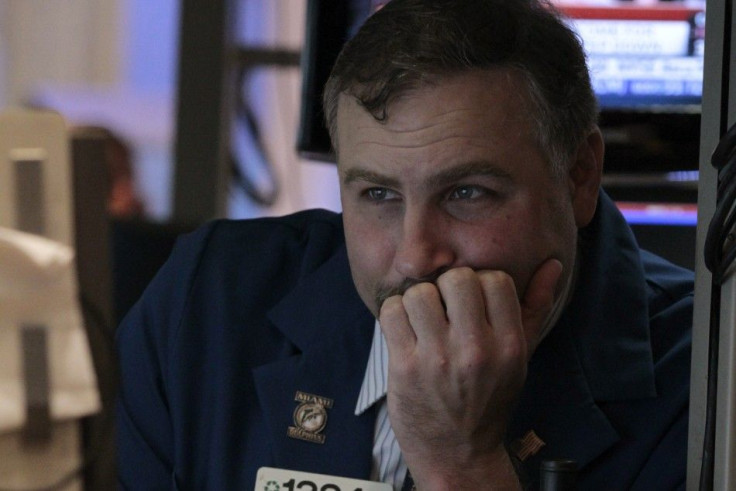Stock Market Plunges: Five Reasons Why

A confluence of concurrent negative factors are conspiring to create a major sell-off in the U.S. stock market on Thursday.
As of noon EST, the major equity indices were down between 3.6 percent and 4.4 percent, while the yield on the 10-year Treasury has plunged to below two percent, an all-time low. Meanwhile, the VIX, known as the fear gauge among investors, has spiked almost 30 percent, to above 40.
Here are five of the most important reasons why U.S. stocks are under pressure on Thursday.
Initial Jobless Claims: Last week, 408,000 people applied for unemployment benefits – the highest such level in a month -- and up from the 399,000 recorded in the prior week.
Generally speaking, when the claims figure exceeds 400,000, it means that the economy isn’t creating jobs fast enough to meet demand. The data suggests that labor markets remain tough and that any economic expansion has slowed to a crawl. In July, the economy added only 117,000 jobs, placing the national unemployment rate at a stubbornly high rate above nine percent.
Inflation: Consumer price inflation rose in the U.S. by 0.5 percent in July, the biggest monthly gain since March, exceeding consensus estimates for a 0.4 percent gain.
Core inflation (which excludes volatile food and energy prices) climbed 0.2 percent, matching expectations, although the annual rate was pushed up to 1.8 percent, a 19-month high. Analysts believe that any further increases in inflation in the coming months would likely dissuade the Federal Reserve from introducing a new round of quantitative easing (QE3) until next year.
Jack Ablin, chief investment officer at Harris Private Bank, told The Associated Press that when prices rise in tandem with a tepid labor market, the Fed has a much harder time stimulating the economy.
Philadelphia Fed: Manufacturing in the Philadelphia region weakened considerably in August, to its lowest level since March 2009. The index plunged to -30.7 from +3.2 in July.
Paul Dales, senior U.S. economist at Capital Economics, described the Philadelphia data as “horrible.
“Coming on the back of a smaller fall in the Empire State index [released on Monday], we need to brace ourselves for the national ISM manufacturing index falling from 50.9 in July to below the supposed boom/bust level of 50 in August,” he wrote.
Neil Dutta, economist at Bank of America-Merrill Lynch, wrote that “the components of today's Philly Fed report were universally weak. Indeed, every major component of this report signaled an outright contraction and all in recession territory.”
He added: “The Philly Fed Index like other regional Fed indicators is sensitive to swings in equity markets. And, the question at hand is whether the weakness in market sentiment prompts businesses to stop investing and consumers to stop spending.”
Existing Home Sales: The National Association of Realtors reported that existing home sales dropped by 3.5 percent to 4.67 million in July, versus expectations for a modest gain.
“At this sales pace, it would take 9.4 months to clear the inventory on the market for sale, almost double the supply in a normal market,” warned Michelle Meyer, economist at Bank of America-Merrill Lynch. “This large imbalance between demand and supply likely will keep downward pressure on home prices and housing construction. The housing market continues to be the weakest link in the economy.”
She added that: “The widening gap between closed (existing) and signed (pending) contracts implies greater cancellations.”
Moreover, she notes, “a decline in investor demand would be a clear negative for the housing market, given the large overhang of foreclosures that need to be sold. If investor demand is drying up, it means prices would have to fall further to clear the excess supply. Hang on to your seats.”
Eurozone Debt: Fears over the eurozone debt crisis continues to dampen investor sentiment across the Atlantic.
Default by any member of the eurozone would prove disastrous for European lenders that hold European sovereign bonds.
The leaders of France and Germany, Nicolas Sarkozy and Angela Merkel, have proposed the establishment of true economic governance to deal with the crisis, but apparently this wasn't viewed with much optimism by markets.
Some countries have borrowed so much money that there is great fear they will default. The bond yields of Italy and Spain have reached their highest levels in fourteen years. “The lack of fiscal discipline and the temptations of low interest rates led to a typical over-consumption crisis, particularly at the periphery of the eurozone,” said Michael Wohlgemuth, a managing research associate at the Walter Eucken Institute in Freiburg, Germany. “Basically, countries like Greece, Portugal and Spain threw a party with borrowed money.”
© Copyright IBTimes 2024. All rights reserved.





















